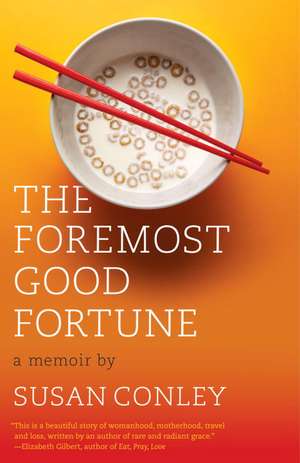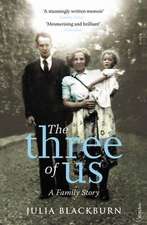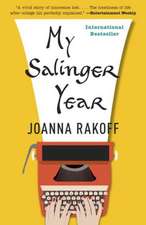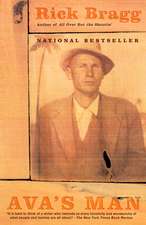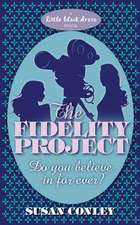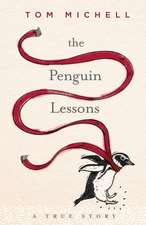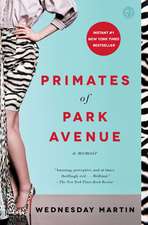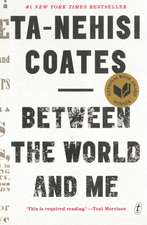The Foremost Good Fortune
Autor Susan E. Conleyen Limba Engleză Paperback – 29 feb 2012
Set against the eternally fascinating backdrop of modern China and full of insight into the trickiest questions of motherhood, this poignant memoir is a celebration of family and a candid exploration of mortality and belonging.
Preț: 126.77 lei
Nou
Puncte Express: 190
Preț estimativ în valută:
24.26€ • 25.38$ • 20.15£
24.26€ • 25.38$ • 20.15£
Carte disponibilă
Livrare economică 12-26 martie
Preluare comenzi: 021 569.72.76
Specificații
ISBN-13: 9780307739865
ISBN-10: 0307739864
Pagini: 368
Dimensiuni: 133 x 203 x 19 mm
Greutate: 0.34 kg
Editura: Vintage Publishing
ISBN-10: 0307739864
Pagini: 368
Dimensiuni: 133 x 203 x 19 mm
Greutate: 0.34 kg
Editura: Vintage Publishing
Notă biografică
Susan Conley lived in Beijing for more than two years, and returned to Portland, Maine, with her husband and two sons in December 2009. She is cofounder and executive director of the Telling Room, a writers’ workshop and literary hub for the region. She was an associate editor at Ploughshares and has led creative writing seminars at Emerson College in Boston. Her work has been published in The New York Times Magazine as well as The Paris Review, Harvard Review, Ploughshares, and other literary magazines. She is currently working on a novel and settling back into life in the States.
Extras
Here's the setup: I'm in the passenger seat of a blue Buick minivan driving through downtown Beijing at three o'clock on a blistering afternoon. A fifty-three-year-old Beijing local named Lao Wu is driving. He will always be the one driving in this story. He wears pressed high-waisted blue jeans and a sharp tan Windbreaker. Driving is his job; that is to say, he's a full-time driver. When Lao Wu came back home from the fields after the Cultural Revolution, the high schools had been closed. That was the week he learned to drive a Mack truck, and he's been driving ever since.
This is my third day in Beijing, and jet lag still pulls me down by my ankles. I lean back in the seat, my mind thick with sleep, and the van slows so I can count twenty waitresses lined up outside the Din Tai Fung dumpling house. The girls wear blue cotton qipaos and do jumping jacks on the sidewalk, then they salute a head waitress who stands on a small, black wooden box. Next they let out a cheer and march in a circle on the sidewalk. The head waitress calls out more instructions (how to fold the napkins? How to take a drink order?) and the girls yell back in a call and response. Then they salute their leader one more time and march into the restaurant.
People don't march much where I'm from. Maybe the occasional high- school band at the annual Bath Memorial Day parade. But marching is very much the way here-some kind of simulation of the hard-nosed Chinese army way of life? Some kind of leftover from the Communist heyday? Except we're still in the Communist heyday, aren't we?
At the apartment complex where we live there are more marching guards. They salute me every time I come back to the building. It's creepy. I want to tell them I'm not their senior officer. No. I am a forty-year-old American wife and mother of two who can't remember how to pronounce the number eight in Mandarin. This is a problem, because eight is where we live. It's China's luckiest number, and let me say right now that numerology is intrinsic to the whole China operation. Numbers here have secret, mystical powers. There are no fourth floors in China because when spoken, the Chinese character for the number 4 sounds too much like the character for death. So what good fortune that our apartment sits on the lucky eighth floor of a building called Park Avenue, across the street from Beijing's biggest city park. It's mostly Chinese families at Park Avenue-well-off Beijingren, the term used for people born and raised in the capital. Many are people who somehow got out during Mao's reign and have returned because China's prospects now look so good. There's also a big handful of Taiwanese here and Hong Kong Chinese and a smattering of Europeans.
We could have lived in Palm Springs or Champagne Villas, Yosemite or Central Park, Park Place or the Beijing Riviera-vast compounds whose names move beyond kitsch into the surreal. To get through the front door of our apartment lobby, we say "Ni hao" to the teenaged guard. He says, "Ni hao" back and salutes us. Then we say "Xie xie," which means thank you, and he says "Bu keqi" (you're welcome), and lets us on the elevator. He salutes us one more time to make sure. We play out this Beckett-like scene of absurdity many times a day, until the humor in it has dried up and flown away on the winds of the Gobi Desert.
Tony has come to introduce credit-rating systems to the Chinese state- owned banks. This means that he meets with senior financial officers, trying to explain in Mandarin why buying complicated American computer programs is crucial to China's success. Sometimes Tony has to pinch himself to make sure it's him and not an imposter wearing that blue banker's suit. Because when Tony lived in Beijing the first time, he had a different gig.
In 1985 Tony took a backpack and a Nikon and headed out on China's trains photographing border zones-places the government here officially calls "ethnic minority regions." Tony started in Yunnan where it meets up with Laos and Burma, and then went northwest to Xinjiang Province where it rubs shoulders with today's "stans": Pakistan, Uzbekistan, Kazakhstan. Next he went south to Tibet and got an early visa for Lhasa. He'd been schooled in Mandarin and had a knack for conversing with strangers, for hitching rides and getting out of pinches with Chinese police. In many towns he was the first laowai the locals had seen. He'd arrive in a village and make friends there and find it hard to leave.
Years ago in San Francisco, when it got so I always wanted to be in the same room with Tony, he gave me one of the photos he took on that trip. Some of the prints had won awards in galleries by then. Mine was of two women sitting in a crop of Hami melons by the side of a dusty road. I hung it in my bedroom and it marked the beginning of my own quiet fascination with Asia. The natural beauty of those women startled me, so did the way they looked right into Tony's camera. The photo made me want to understand him more. He knew himself well. There was a quiet self-sufficiency. Where did that come from?
I have never been to China. I do not speak the language. I've bought a Chinese desk. My plan in Beijing is to finish a novel-two hundred pages of a rough draft set in Paris. The boys are here to go to school. It is what boys do. Or at least that's what I keep telling them they do. Their school is a twenty-minute highway ride south of our apartment. It sits down the road from the underpass that marks one of Beijing's busiest intersections: a six-way juggernaut of rickshaws, one-speeds, VW Santanas, and horses and wagons. Today, a horde of teenage vendors has set up shop on the sidewalks to sell chestnuts and lychees, and baked sweet potatoes. These streets are not pedestrian friendly-they're long blocks of strip malls and food stalls and mid-rises in all stages of rehab and post hab. Throngs of people walk in the roads buying and selling like mad. There's Tsingtao beer for sale, and turtles, and athletic socks, and phone chargers. How strange and dazzling.
The more I stare, the more arbitrary those marching waitresses back down the road begin to seem-like some kind of imposed order. Finger in the dam. There's so much humanity here; a dozen men take a snooze on the strip of concrete below the overpass. There's a woman walking just ahead in a bright Mickey Mouse T-shirt who pauses to blow her nose into the gutter. To the right of the gridlock, hundreds of people wait in line for buses. A large floral display stands next to the ticket kiosk-something you might see in a Macy's Thanksgiving Day parade, made entirely of yellow chrysanthemums that spell out the words "Beijing 2008 Games." Next to the sign a woman sells slices of yellow Hami melon on wooden skewers. A line of black Audis weaves in front of our van with their lights on and a rose garland battened to each hood. Lao Wu smiles and points to the bride and groom who ride in front of the procession in a blue Hummer.
I've never seen so many people riding bicycles, and I can't stop staring. They're helmetless and willing to risk their lives dodging cars. Many women wear black office pumps and knee-length polyester dresses; men are in nylon business slacks with white-collared shirts. At first, the joke would seem to be on the cars, because they can't get through the mess. But it's the cars that will prevail here-there are one thousand more on the road every day, which makes the bicycles begin to look like living artifacts.
We're creeping through a series of traffic lights, and I'm sure the words I hear on the radio are in English. I ask Lao Wu to turn up the volume by making a circular motion with my right hand. "Ying yu?" I say excitedly. Is it English? Then I repeat, "Ying yu?" and then I'm hit with a rolling wave of homesickness.
"No," Lao Wu says decisively. "Han yu." Chinese.
But I'm sure I can hear English on the radio. I will it to be English. A motorbike passes-the driver's wife sits behind him with a baby in her lap, and a toddler sits up front on the handlebars. I want to be driving I-95 north from Portland to Phippsburg, listening to the local radio. I want to be sitting in my mother's kitchen in West Point while she reminds my brother, John, on the phone how to make chocolate fudge. John's a very tall man now and one of my best friends, and in the 1970s he made a lot of fudge.
I want to listen to any single conversation I can understand. Because this is too much-an entire country that doesn't speak English. City of fifteen million with no readable road signs. City of marchers. That's when Lao Wu turns up the volume and laughs, and I think I'm going to really like him. I laugh too and nod my head, because of course. Of course it's Chinese on the radio. We are, after all, in China. It's Monday in Beijing and we've got work to do. Children to pick up from school. The first day is bound to be rocky.
We pull up to the school gate, and the street looks like a construction zone: garbage lies along the sides of the road-plastic food tubs and paper wrappings. Cement high-rises stretch as far as I can see. Some are empty shells. Others get air-conditioning units soldered by men dangling on ropes. The total sum of so many skyscrapers has a zeroing-out effect. There's such a great deal of heavy machinery and laying of rebar that my mind clouds over. What kind of city has no sidewalks?
A green bulldozer barrels through the cars and drops a load of brown dirt to the left of our van. The driver wears a black polyester sports jacket and a yellow hard hat. Ten men attack the dirt with shovels. They're the migrant workers you might have heard about. The ones who've left their farms in the countryside-millions of them-to ready Beijing for the Olympics. They're the ones transforming China. They work for about two dollars a day. The migrant workers don't march. Most of them smoke while they shovel. Some of them are barefoot. Some of them are shirtless, and theirs is a story of epic migration-of sleeping along this road under green tarps that line the sidewalk, or in flimsy tin barracks behind the work site.
I lean against the metal school gate and look into the courtyard, and that's when the school's security guards leave their posts and begin marching in formation. Their faux-military uniforms-brass belt buckles, long blue jackets, and blue pants-make them look like mid- level army. They march to the open space across from the fleet of parked school buses, where they salute their head guard, which makes me nervous. This is not a military academy, is it? How big a city Beijing must be to hold these contradictions.
The school is called Beijing City International School. We chose it from a Web site. Then Tony took a tour of it when he came over two months ago. The way I see it, this school is a crapshoot. How can you pick teachers from photos on the Internet? The one thing I already like about the place, though, is that few American kids attend. There are Korean children and Taiwanese and Hong Kong Chinese, plus Indians, Australians, Europeans, and Brazilians.
The school advertised a secular curriculum: Chinese language classes every day and a focus on being "internationally minded." There's supposed to be art and music and swimming. No marching. Small people emerge from the building-little children who don't look like they could be old enough to hold their heads up inside a school building all day. The children's blue backpacks are bigger than their torsos. Here comes Aidan's preschool class. And there's Aidan. He's a thin bean with sandy brown hair and huge almond-shaped eyes. He's usually a dreamer who never stops wondering about the state of the universe. Sometimes he lives entirely in his head. But right now he looks tired and cross, and as soon as he sees me, he starts crying. He thrusts his backpack in my hands. "Do you have a snack for me? Do you have water? I'm thirsty. I'm hot." His teacher, Carmel, is from Australia, and she reminds me of a high-school friend's fun great-aunt. She smiles and tells me warmly that Aidan's had a great first day. She calls him daaaaarling. But he won't look at her. She says he's just wound up about getting the answer right in Chinese.
Then Thorne rounds the corner. He's the blond in our family: dark eyes and tan skin and then this shock of bright hair. Thorne likes to be out in front whenever I give up the pole position. He prefers to know the game plan and the score and the names of the opposing players. Thorne and I have telepathy. We're that much alike. Aidan has come to us from another planet, but Thorne is blood of my blood and milk of my milk. Thorne is our camp director. He doesn't have time to dream because he's busy planning the afternoon's aquatic schedule. He doesn't have time to think. I have come to view this as a good thing. And maybe a cunning strategy.
Now he sees me and also shoves his things into my chest: water bottle, backpack, sweatshirt. I can't hold all this stuff, and the water bottle falls. Thorne says, "You should have come earlier. You shouldn't have come to school so late." But who's late? I want to ask. If anything, I'm early. "You should have come earlier," he repeats, and then tears start down the sides of his round face and I realize we're in deeper than I thought here. All three of us are overtired. By the time we get to the van, both children have unhinged: Thorne hates his Chinese class and announces he's never going back. "Never," he sobs. "You have no right to make me."
Lao Wu smiles at me uneasily and closes the windows and turns on the AC. He seems as unnerved by the crying as I am and keeps laughing and making tsk-tsk sounds with his tongue as if to quiet Thorne. I smile at Lao Wu, but my hands are shaking a little. I need to talk these boys down. I wonder for a second which tack to take-and exactly how much English Lao Wu can understand. Because it's an odd thing to have your children unravel while a friendly Chinese man you've just met drives you through the Beijing stoplights. What will Lao Wu think of us-these American children and their mother crying their way home from school?
Except I am not crying. Not yet. Crying doesn't feel like an option. There's too much to get right. Aidan drinks from the water bottle I hand him and begins to give me a list of the reasons the new school is terrible. "Really bad," Aidan cries for emphasis. "Small bikes, yucky food. And boring. Boring, boring, boring. Nothing to do."
“Really?” I try not to panic. I look out the window at the passing skyscrapers. Things were good in Maine. And now we’ve gone and
messed with it. I would lie down in this Chinese road for both of my boys, but I can’t live in this country with two complainers. I need them to show a little spunk.
“You know why I like my old school better?” Aidan asks.
“No, why?” I say and slightly clench my jaw.
“I like my old school better because it has swings,” Aidan explains.
“And I wish I were Chinese. Or Korean, because then I would be able to talk to the kids.”
“But your new school has swings.” I close my eyes for a second. I should state for the record that I have secret mother superpowers. Yes. I have the ability to detach from my children and climb into my own mind at the exact moments my boys might be telling me something they think is vitally important. And I know. I know. It’s not necessarily safe. It’s not necessarily compassionate. But what I do is build a small room in my head— closet- sized—and go inside and close the door. I can still see them; I just can’t quite hear them. I go inside this room so I can think clearly. I go inside because the two boys exhaust me. They never let up. They never go play house or with fi nger puppets or dolls. They don’t even play with Legos. Their games involve running and jumping and leaping off furniture. And they always want me to be the referee. I go inside the room in my mind because it’s a way to not blow my top and lose it with them. Before I built this room I used to yell at them more. They were one and three or two and four and always climbing on the small tile ledge around the bathtub. No one was sleeping through the night.
“My old school had sturdier stuff.” Aidan sips his water.
“Sturdier?” I look at him closely and wonder about that room in my mind and how quickly I can get in there. Because the machinery in Aidan’s head is testing me. His eyes are a shade of brown that looks wet sometimes because the brown is so dark. You can’t see the irises. He’s four years old—why does his mind spit out words like sturdier?
“Yeah.” Aidan looks back at me again. “The climbing stuff was sturdier.”
Then Thorne chimes in that he doesn’t know anyone at this school.
“Where are my friends?” It’s a simple question. And it deserves a good answer. The boys’ urge to belong is palpable. I feel it, too—a primal need to fi t in here somehow, to reach some kind of early understanding with China.
By the time we get back to the apartment complex, it’s begun to rain. We climb out of the van and say good- bye to Lao Wu. Then one of our Chinese neighbors approaches on the sidewalk and points up to the sky. He’s an old man with white hair, and he says in English that each time it rains in Beijing, the temperature drops fi ve degrees. That this is how we get ourselves through autumn in China: rainfall by rainfall, five-degree increments by five-degree increments.
From the Hardcover edition.
This is my third day in Beijing, and jet lag still pulls me down by my ankles. I lean back in the seat, my mind thick with sleep, and the van slows so I can count twenty waitresses lined up outside the Din Tai Fung dumpling house. The girls wear blue cotton qipaos and do jumping jacks on the sidewalk, then they salute a head waitress who stands on a small, black wooden box. Next they let out a cheer and march in a circle on the sidewalk. The head waitress calls out more instructions (how to fold the napkins? How to take a drink order?) and the girls yell back in a call and response. Then they salute their leader one more time and march into the restaurant.
People don't march much where I'm from. Maybe the occasional high- school band at the annual Bath Memorial Day parade. But marching is very much the way here-some kind of simulation of the hard-nosed Chinese army way of life? Some kind of leftover from the Communist heyday? Except we're still in the Communist heyday, aren't we?
At the apartment complex where we live there are more marching guards. They salute me every time I come back to the building. It's creepy. I want to tell them I'm not their senior officer. No. I am a forty-year-old American wife and mother of two who can't remember how to pronounce the number eight in Mandarin. This is a problem, because eight is where we live. It's China's luckiest number, and let me say right now that numerology is intrinsic to the whole China operation. Numbers here have secret, mystical powers. There are no fourth floors in China because when spoken, the Chinese character for the number 4 sounds too much like the character for death. So what good fortune that our apartment sits on the lucky eighth floor of a building called Park Avenue, across the street from Beijing's biggest city park. It's mostly Chinese families at Park Avenue-well-off Beijingren, the term used for people born and raised in the capital. Many are people who somehow got out during Mao's reign and have returned because China's prospects now look so good. There's also a big handful of Taiwanese here and Hong Kong Chinese and a smattering of Europeans.
We could have lived in Palm Springs or Champagne Villas, Yosemite or Central Park, Park Place or the Beijing Riviera-vast compounds whose names move beyond kitsch into the surreal. To get through the front door of our apartment lobby, we say "Ni hao" to the teenaged guard. He says, "Ni hao" back and salutes us. Then we say "Xie xie," which means thank you, and he says "Bu keqi" (you're welcome), and lets us on the elevator. He salutes us one more time to make sure. We play out this Beckett-like scene of absurdity many times a day, until the humor in it has dried up and flown away on the winds of the Gobi Desert.
Tony has come to introduce credit-rating systems to the Chinese state- owned banks. This means that he meets with senior financial officers, trying to explain in Mandarin why buying complicated American computer programs is crucial to China's success. Sometimes Tony has to pinch himself to make sure it's him and not an imposter wearing that blue banker's suit. Because when Tony lived in Beijing the first time, he had a different gig.
In 1985 Tony took a backpack and a Nikon and headed out on China's trains photographing border zones-places the government here officially calls "ethnic minority regions." Tony started in Yunnan where it meets up with Laos and Burma, and then went northwest to Xinjiang Province where it rubs shoulders with today's "stans": Pakistan, Uzbekistan, Kazakhstan. Next he went south to Tibet and got an early visa for Lhasa. He'd been schooled in Mandarin and had a knack for conversing with strangers, for hitching rides and getting out of pinches with Chinese police. In many towns he was the first laowai the locals had seen. He'd arrive in a village and make friends there and find it hard to leave.
Years ago in San Francisco, when it got so I always wanted to be in the same room with Tony, he gave me one of the photos he took on that trip. Some of the prints had won awards in galleries by then. Mine was of two women sitting in a crop of Hami melons by the side of a dusty road. I hung it in my bedroom and it marked the beginning of my own quiet fascination with Asia. The natural beauty of those women startled me, so did the way they looked right into Tony's camera. The photo made me want to understand him more. He knew himself well. There was a quiet self-sufficiency. Where did that come from?
I have never been to China. I do not speak the language. I've bought a Chinese desk. My plan in Beijing is to finish a novel-two hundred pages of a rough draft set in Paris. The boys are here to go to school. It is what boys do. Or at least that's what I keep telling them they do. Their school is a twenty-minute highway ride south of our apartment. It sits down the road from the underpass that marks one of Beijing's busiest intersections: a six-way juggernaut of rickshaws, one-speeds, VW Santanas, and horses and wagons. Today, a horde of teenage vendors has set up shop on the sidewalks to sell chestnuts and lychees, and baked sweet potatoes. These streets are not pedestrian friendly-they're long blocks of strip malls and food stalls and mid-rises in all stages of rehab and post hab. Throngs of people walk in the roads buying and selling like mad. There's Tsingtao beer for sale, and turtles, and athletic socks, and phone chargers. How strange and dazzling.
The more I stare, the more arbitrary those marching waitresses back down the road begin to seem-like some kind of imposed order. Finger in the dam. There's so much humanity here; a dozen men take a snooze on the strip of concrete below the overpass. There's a woman walking just ahead in a bright Mickey Mouse T-shirt who pauses to blow her nose into the gutter. To the right of the gridlock, hundreds of people wait in line for buses. A large floral display stands next to the ticket kiosk-something you might see in a Macy's Thanksgiving Day parade, made entirely of yellow chrysanthemums that spell out the words "Beijing 2008 Games." Next to the sign a woman sells slices of yellow Hami melon on wooden skewers. A line of black Audis weaves in front of our van with their lights on and a rose garland battened to each hood. Lao Wu smiles and points to the bride and groom who ride in front of the procession in a blue Hummer.
I've never seen so many people riding bicycles, and I can't stop staring. They're helmetless and willing to risk their lives dodging cars. Many women wear black office pumps and knee-length polyester dresses; men are in nylon business slacks with white-collared shirts. At first, the joke would seem to be on the cars, because they can't get through the mess. But it's the cars that will prevail here-there are one thousand more on the road every day, which makes the bicycles begin to look like living artifacts.
We're creeping through a series of traffic lights, and I'm sure the words I hear on the radio are in English. I ask Lao Wu to turn up the volume by making a circular motion with my right hand. "Ying yu?" I say excitedly. Is it English? Then I repeat, "Ying yu?" and then I'm hit with a rolling wave of homesickness.
"No," Lao Wu says decisively. "Han yu." Chinese.
But I'm sure I can hear English on the radio. I will it to be English. A motorbike passes-the driver's wife sits behind him with a baby in her lap, and a toddler sits up front on the handlebars. I want to be driving I-95 north from Portland to Phippsburg, listening to the local radio. I want to be sitting in my mother's kitchen in West Point while she reminds my brother, John, on the phone how to make chocolate fudge. John's a very tall man now and one of my best friends, and in the 1970s he made a lot of fudge.
I want to listen to any single conversation I can understand. Because this is too much-an entire country that doesn't speak English. City of fifteen million with no readable road signs. City of marchers. That's when Lao Wu turns up the volume and laughs, and I think I'm going to really like him. I laugh too and nod my head, because of course. Of course it's Chinese on the radio. We are, after all, in China. It's Monday in Beijing and we've got work to do. Children to pick up from school. The first day is bound to be rocky.
We pull up to the school gate, and the street looks like a construction zone: garbage lies along the sides of the road-plastic food tubs and paper wrappings. Cement high-rises stretch as far as I can see. Some are empty shells. Others get air-conditioning units soldered by men dangling on ropes. The total sum of so many skyscrapers has a zeroing-out effect. There's such a great deal of heavy machinery and laying of rebar that my mind clouds over. What kind of city has no sidewalks?
A green bulldozer barrels through the cars and drops a load of brown dirt to the left of our van. The driver wears a black polyester sports jacket and a yellow hard hat. Ten men attack the dirt with shovels. They're the migrant workers you might have heard about. The ones who've left their farms in the countryside-millions of them-to ready Beijing for the Olympics. They're the ones transforming China. They work for about two dollars a day. The migrant workers don't march. Most of them smoke while they shovel. Some of them are barefoot. Some of them are shirtless, and theirs is a story of epic migration-of sleeping along this road under green tarps that line the sidewalk, or in flimsy tin barracks behind the work site.
I lean against the metal school gate and look into the courtyard, and that's when the school's security guards leave their posts and begin marching in formation. Their faux-military uniforms-brass belt buckles, long blue jackets, and blue pants-make them look like mid- level army. They march to the open space across from the fleet of parked school buses, where they salute their head guard, which makes me nervous. This is not a military academy, is it? How big a city Beijing must be to hold these contradictions.
The school is called Beijing City International School. We chose it from a Web site. Then Tony took a tour of it when he came over two months ago. The way I see it, this school is a crapshoot. How can you pick teachers from photos on the Internet? The one thing I already like about the place, though, is that few American kids attend. There are Korean children and Taiwanese and Hong Kong Chinese, plus Indians, Australians, Europeans, and Brazilians.
The school advertised a secular curriculum: Chinese language classes every day and a focus on being "internationally minded." There's supposed to be art and music and swimming. No marching. Small people emerge from the building-little children who don't look like they could be old enough to hold their heads up inside a school building all day. The children's blue backpacks are bigger than their torsos. Here comes Aidan's preschool class. And there's Aidan. He's a thin bean with sandy brown hair and huge almond-shaped eyes. He's usually a dreamer who never stops wondering about the state of the universe. Sometimes he lives entirely in his head. But right now he looks tired and cross, and as soon as he sees me, he starts crying. He thrusts his backpack in my hands. "Do you have a snack for me? Do you have water? I'm thirsty. I'm hot." His teacher, Carmel, is from Australia, and she reminds me of a high-school friend's fun great-aunt. She smiles and tells me warmly that Aidan's had a great first day. She calls him daaaaarling. But he won't look at her. She says he's just wound up about getting the answer right in Chinese.
Then Thorne rounds the corner. He's the blond in our family: dark eyes and tan skin and then this shock of bright hair. Thorne likes to be out in front whenever I give up the pole position. He prefers to know the game plan and the score and the names of the opposing players. Thorne and I have telepathy. We're that much alike. Aidan has come to us from another planet, but Thorne is blood of my blood and milk of my milk. Thorne is our camp director. He doesn't have time to dream because he's busy planning the afternoon's aquatic schedule. He doesn't have time to think. I have come to view this as a good thing. And maybe a cunning strategy.
Now he sees me and also shoves his things into my chest: water bottle, backpack, sweatshirt. I can't hold all this stuff, and the water bottle falls. Thorne says, "You should have come earlier. You shouldn't have come to school so late." But who's late? I want to ask. If anything, I'm early. "You should have come earlier," he repeats, and then tears start down the sides of his round face and I realize we're in deeper than I thought here. All three of us are overtired. By the time we get to the van, both children have unhinged: Thorne hates his Chinese class and announces he's never going back. "Never," he sobs. "You have no right to make me."
Lao Wu smiles at me uneasily and closes the windows and turns on the AC. He seems as unnerved by the crying as I am and keeps laughing and making tsk-tsk sounds with his tongue as if to quiet Thorne. I smile at Lao Wu, but my hands are shaking a little. I need to talk these boys down. I wonder for a second which tack to take-and exactly how much English Lao Wu can understand. Because it's an odd thing to have your children unravel while a friendly Chinese man you've just met drives you through the Beijing stoplights. What will Lao Wu think of us-these American children and their mother crying their way home from school?
Except I am not crying. Not yet. Crying doesn't feel like an option. There's too much to get right. Aidan drinks from the water bottle I hand him and begins to give me a list of the reasons the new school is terrible. "Really bad," Aidan cries for emphasis. "Small bikes, yucky food. And boring. Boring, boring, boring. Nothing to do."
“Really?” I try not to panic. I look out the window at the passing skyscrapers. Things were good in Maine. And now we’ve gone and
messed with it. I would lie down in this Chinese road for both of my boys, but I can’t live in this country with two complainers. I need them to show a little spunk.
“You know why I like my old school better?” Aidan asks.
“No, why?” I say and slightly clench my jaw.
“I like my old school better because it has swings,” Aidan explains.
“And I wish I were Chinese. Or Korean, because then I would be able to talk to the kids.”
“But your new school has swings.” I close my eyes for a second. I should state for the record that I have secret mother superpowers. Yes. I have the ability to detach from my children and climb into my own mind at the exact moments my boys might be telling me something they think is vitally important. And I know. I know. It’s not necessarily safe. It’s not necessarily compassionate. But what I do is build a small room in my head— closet- sized—and go inside and close the door. I can still see them; I just can’t quite hear them. I go inside this room so I can think clearly. I go inside because the two boys exhaust me. They never let up. They never go play house or with fi nger puppets or dolls. They don’t even play with Legos. Their games involve running and jumping and leaping off furniture. And they always want me to be the referee. I go inside the room in my mind because it’s a way to not blow my top and lose it with them. Before I built this room I used to yell at them more. They were one and three or two and four and always climbing on the small tile ledge around the bathtub. No one was sleeping through the night.
“My old school had sturdier stuff.” Aidan sips his water.
“Sturdier?” I look at him closely and wonder about that room in my mind and how quickly I can get in there. Because the machinery in Aidan’s head is testing me. His eyes are a shade of brown that looks wet sometimes because the brown is so dark. You can’t see the irises. He’s four years old—why does his mind spit out words like sturdier?
“Yeah.” Aidan looks back at me again. “The climbing stuff was sturdier.”
Then Thorne chimes in that he doesn’t know anyone at this school.
“Where are my friends?” It’s a simple question. And it deserves a good answer. The boys’ urge to belong is palpable. I feel it, too—a primal need to fi t in here somehow, to reach some kind of early understanding with China.
By the time we get back to the apartment complex, it’s begun to rain. We climb out of the van and say good- bye to Lao Wu. Then one of our Chinese neighbors approaches on the sidewalk and points up to the sky. He’s an old man with white hair, and he says in English that each time it rains in Beijing, the temperature drops fi ve degrees. That this is how we get ourselves through autumn in China: rainfall by rainfall, five-degree increments by five-degree increments.
From the Hardcover edition.
Recenzii
One of O, The Oprah Magazine’s 10 Titles to Pick Up Now
“This is a beautiful story of womanhood, motherhood, travel and loss, written by an author of rare and radiant grace.” —Elizabeth Gilbert, author of Eat, Pray, Love
“You hear about riveting prose, and this is it. . . . This is a beautiful book about China and cancer and how to be an authentic, courageous human being.” —The Washington Post
“Susan Conley has written a moving and deeply thoughtful memoir about her years in China. . . . This book is for anybody who has felt out of place, whether in a foreign country or a doctor’s office.” —Peter Hessler, author of Oracle Bones
“Conley deftly balances humor, poignancy and a fierce honesty. . . . This is a book of fortitude, of good humor, of a love that is absolute and enduring.” —The Oregonian
“Memoirs, I’ve come to understand, have a particular way of preparing us. We will all find ourselves up against life-threatening illness, and when we do, the masterful passages in this book will come flooding back to us, bringing perspective and comfort with every remembered word.” —Kelly Corrigan, author of The Middle Place
“It’s difficult to move halfway around the world and try to make a home for yourself—even a temporary one—in an alien land. It’s harder still to be diagnosed with a serious illness, undergo surgery and treatment, and cope with the aftermath of that process. Undertaking both at the same time seems overwhelming. . . . Conley’s ability to describe her challenges honestly, without self-pity, leads you not only to relate to her, but also to admire her.” —Slate, Book of the Week
“A journey of isolation, both physical and cultural. . . . Always fresh and engaging. . . . Conley . . . reveals how friendship buttresses women’s lives.” —The Boston Globe
“The Foremost Good Fortune is a moving and exhilarating ride, as well as a deep meditation on family, belief and mortality. . . . Conley resets the bar for the memoir with her humor, sensitivity, and stunning sentences.” —Lily King, author of Father of the Rain
“Remarkable. . . . In graceful and honest prose, she effectively tells both sides of her tale. She gets us to identify and empathize.” —San Francisco Chronicle
“A wonderful account of the sense of dislocation and difficulties—the sheer plunge-in-icy-water shock—that comes with moving a family to China.” —The Telegraph (London)
"Susan Conley's memoir about her family's move to Beijing has a little of everything. It's funny, sweet and charming, but it's also moving and emotional. Conley's diagnosis with breast cancer during their China stay is a difficult obstacle, but the author never loses her wit and grace in the face of the toughest battles, both cultural and health-related. . . . More than just a cancer memoir or a travelogue, The Foremost Good Fortune is a reflection on life, at its best and worst moments." —SheKnows.com
“The Foremost Good Fortune is a treasure: The unique experience of being yanked out of context by moving to China and diagnosed with breast cancer allows Conley, paradoxically, to explore the most universal of women’s experiences—the meaning of our lives, the meaning of motherhood, the meaning of partnership.” —Peggy Orenstein, author of Cinderella Ate My Daughter
“The Foremost Good Fortune contains moments both heartwarming and heart-wrenching.” —The Portland Phoenix
“I loved this memoir not only for its humor and humility, but for its gentle weaving of disparate elements—dislocation, illness, motherhood, travel, marriage—into a seamless, irresistible whole. It is beautifully written.” —Monica Wood, author of Any Bitter Thing
“Startling, poignant.” —More
“This is an exquisite memoir, a gripping story from page one that tugs you along with the honest questioning and insightful whispers of a courageous best friend.” —Jeanne Marie Laskas, author of Growing Girls
“Conley’s lovely memoir powerfully reminds us that we draw our strength from the many little wonders of our everyday lives.” —BookPage
“Some books pull you into their orbit, taking you to another world. Susan Conley’s vivid memoir . . . is a case in point.” —The Portland Press Herald
“A story of resilience, told with grace and humor, and with Chinese accents.” —James Fallows, author of Postcards from Tomorrow Square
“Rewardingly perceptive and frank.” —Richmond Times-Dispatch
“The Foremost Good Fortune is told by an intrepid traveler who has found her voice in a daunting, exhilarating cultural wilderness … and has found it with wisdom and grace and wonder.” —Michael Paterniti, author of Driving Mr. Albert: A Trip across America with Einstein's Brain
“You wouldn’t expect to see yourself in Susan Conley’s new memoir . . . . But you will. . . . A beautifully intimate story of homesickness and culture shock, of motherhood and illness, of China and cancer, and the unwavering truths of family and friends and home.” —Down East magazine
“Irresistible. . . . An increasingly metaphysical narrative, Conley’s ‘travelogue’ aptly describes living under Communism, what Beijing was like as it prepared for the 2008 Olympics, and ultimately, what it means to be a foreigner in a strange place.”—The Post and Courier (Charleston, SC)
“Far from your typical expat vanity project, The Foremost Good Fortune offers surprising depth and clarity on just what it means to live outside out comfort zones.” — The Beijinger
“Anyone who has ever fallen ill in a foreign country knows how scary that can be. . . . This touching memoir is a study in fortitude and acceptance, an inspiring read with much to say.” —The Missourian
“Offers insightful glimpses into contemporary China as [Conley] warms towards it, capturing the nuances of Beijing’s colorful people and its ancient language and customs amid the country’s unrelenting drive towards modernity.” —Time Out Hong Kong
“Luminous. . . . Conley's writing is at once spare and strong, and her description of having to present an unflappable front to her children while being hit "with a rolling wave of homesickness" pulls the reader into her world like a close friend.” —Publishers Weekly (starred)
“This is a beautiful story of womanhood, motherhood, travel and loss, written by an author of rare and radiant grace.” —Elizabeth Gilbert, author of Eat, Pray, Love
“You hear about riveting prose, and this is it. . . . This is a beautiful book about China and cancer and how to be an authentic, courageous human being.” —The Washington Post
“Susan Conley has written a moving and deeply thoughtful memoir about her years in China. . . . This book is for anybody who has felt out of place, whether in a foreign country or a doctor’s office.” —Peter Hessler, author of Oracle Bones
“Conley deftly balances humor, poignancy and a fierce honesty. . . . This is a book of fortitude, of good humor, of a love that is absolute and enduring.” —The Oregonian
“Memoirs, I’ve come to understand, have a particular way of preparing us. We will all find ourselves up against life-threatening illness, and when we do, the masterful passages in this book will come flooding back to us, bringing perspective and comfort with every remembered word.” —Kelly Corrigan, author of The Middle Place
“It’s difficult to move halfway around the world and try to make a home for yourself—even a temporary one—in an alien land. It’s harder still to be diagnosed with a serious illness, undergo surgery and treatment, and cope with the aftermath of that process. Undertaking both at the same time seems overwhelming. . . . Conley’s ability to describe her challenges honestly, without self-pity, leads you not only to relate to her, but also to admire her.” —Slate, Book of the Week
“A journey of isolation, both physical and cultural. . . . Always fresh and engaging. . . . Conley . . . reveals how friendship buttresses women’s lives.” —The Boston Globe
“The Foremost Good Fortune is a moving and exhilarating ride, as well as a deep meditation on family, belief and mortality. . . . Conley resets the bar for the memoir with her humor, sensitivity, and stunning sentences.” —Lily King, author of Father of the Rain
“Remarkable. . . . In graceful and honest prose, she effectively tells both sides of her tale. She gets us to identify and empathize.” —San Francisco Chronicle
“A wonderful account of the sense of dislocation and difficulties—the sheer plunge-in-icy-water shock—that comes with moving a family to China.” —The Telegraph (London)
"Susan Conley's memoir about her family's move to Beijing has a little of everything. It's funny, sweet and charming, but it's also moving and emotional. Conley's diagnosis with breast cancer during their China stay is a difficult obstacle, but the author never loses her wit and grace in the face of the toughest battles, both cultural and health-related. . . . More than just a cancer memoir or a travelogue, The Foremost Good Fortune is a reflection on life, at its best and worst moments." —SheKnows.com
“The Foremost Good Fortune is a treasure: The unique experience of being yanked out of context by moving to China and diagnosed with breast cancer allows Conley, paradoxically, to explore the most universal of women’s experiences—the meaning of our lives, the meaning of motherhood, the meaning of partnership.” —Peggy Orenstein, author of Cinderella Ate My Daughter
“The Foremost Good Fortune contains moments both heartwarming and heart-wrenching.” —The Portland Phoenix
“I loved this memoir not only for its humor and humility, but for its gentle weaving of disparate elements—dislocation, illness, motherhood, travel, marriage—into a seamless, irresistible whole. It is beautifully written.” —Monica Wood, author of Any Bitter Thing
“Startling, poignant.” —More
“This is an exquisite memoir, a gripping story from page one that tugs you along with the honest questioning and insightful whispers of a courageous best friend.” —Jeanne Marie Laskas, author of Growing Girls
“Conley’s lovely memoir powerfully reminds us that we draw our strength from the many little wonders of our everyday lives.” —BookPage
“Some books pull you into their orbit, taking you to another world. Susan Conley’s vivid memoir . . . is a case in point.” —The Portland Press Herald
“A story of resilience, told with grace and humor, and with Chinese accents.” —James Fallows, author of Postcards from Tomorrow Square
“Rewardingly perceptive and frank.” —Richmond Times-Dispatch
“The Foremost Good Fortune is told by an intrepid traveler who has found her voice in a daunting, exhilarating cultural wilderness … and has found it with wisdom and grace and wonder.” —Michael Paterniti, author of Driving Mr. Albert: A Trip across America with Einstein's Brain
“You wouldn’t expect to see yourself in Susan Conley’s new memoir . . . . But you will. . . . A beautifully intimate story of homesickness and culture shock, of motherhood and illness, of China and cancer, and the unwavering truths of family and friends and home.” —Down East magazine
“Irresistible. . . . An increasingly metaphysical narrative, Conley’s ‘travelogue’ aptly describes living under Communism, what Beijing was like as it prepared for the 2008 Olympics, and ultimately, what it means to be a foreigner in a strange place.”—The Post and Courier (Charleston, SC)
“Far from your typical expat vanity project, The Foremost Good Fortune offers surprising depth and clarity on just what it means to live outside out comfort zones.” — The Beijinger
“Anyone who has ever fallen ill in a foreign country knows how scary that can be. . . . This touching memoir is a study in fortitude and acceptance, an inspiring read with much to say.” —The Missourian
“Offers insightful glimpses into contemporary China as [Conley] warms towards it, capturing the nuances of Beijing’s colorful people and its ancient language and customs amid the country’s unrelenting drive towards modernity.” —Time Out Hong Kong
“Luminous. . . . Conley's writing is at once spare and strong, and her description of having to present an unflappable front to her children while being hit "with a rolling wave of homesickness" pulls the reader into her world like a close friend.” —Publishers Weekly (starred)
